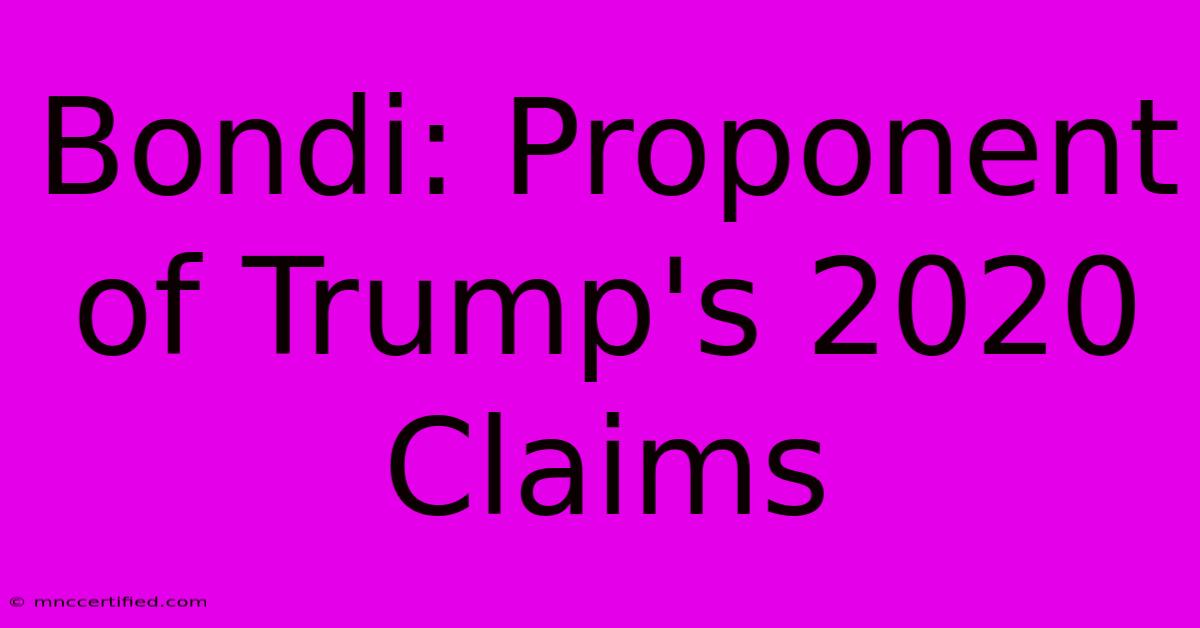Bondi: Proponent Of Trump's 2020 Claims

Table of Contents
Bondi: A Key Proponent of Trump's 2020 Election Claims
The 2020 United States presidential election was deeply divisive, and the aftermath saw a wave of contested claims regarding its outcome. Among the prominent figures who actively promoted these claims was Florida Attorney General Ashley Moody. Her role, particularly in relation to her actions and statements regarding alleged election irregularities, remains a significant point of discussion and scrutiny. This article will delve into Ashley Moody's involvement in supporting Donald Trump's claims of a stolen election.
Moody's Actions and Statements
Ashley Moody, a Republican, played a visible role in the post-election period, aligning herself closely with Donald Trump's assertions of widespread voter fraud. This support wasn't merely passive; it involved active participation in legal challenges and public pronouncements.
Joining Amicus Briefs
Moody joined several amicus briefs filed in legal challenges to the 2020 election results. These briefs, submitted to the Supreme Court and other courts, argued for various claims of election irregularities and irregularities in the counting process. This active participation solidified her position as a key supporter of Trump's legal strategy aimed at overturning the election results. The arguments presented in these briefs, while echoing Trump's claims, faced significant challenges and ultimately failed to achieve their objectives.
Public Statements and Press Conferences
Beyond legal filings, Moody engaged in public pronouncements and press conferences where she echoed and amplified Trump's claims. These public statements lent credence to the narrative of a stolen election, contributing to the spread of misinformation and distrust in the electoral process. Her pronouncements often lacked specific evidence, fueling criticism from opposing viewpoints.
Allegations of Voter Fraud and Their Lack of Evidence
A critical aspect of Moody's support for Trump's claims lies in the allegations of widespread voter fraud that were central to the legal challenges. It’s crucial to note that these allegations, widely disseminated by Moody and other Trump allies, lacked substantial evidence and were largely dismissed by courts due to lack of credible evidence. Many of the lawsuits were rejected due to a lack of standing or procedural deficiencies, highlighting the weak foundation upon which these claims rested.
Criticisms and Consequences
Moody's actions have faced significant criticism from various quarters. Opponents have accused her of undermining democratic institutions and spreading disinformation. The lack of evidence supporting the claims she amplified has drawn considerable attention, leading to questions about her judgment and adherence to legal principles.
Furthermore, her actions may have long-term consequences, contributing to a broader erosion of public trust in elections and governmental institutions. The consequences of such actions extend beyond legal battles and political discourse, impacting the overall civic health of the nation.
Conclusion: A Lasting Impact
Ashley Moody's staunch support for Donald Trump's 2020 election claims remains a pivotal aspect of the post-election narrative. Her actions, encompassing legal filings, public statements, and amplification of unsubstantiated allegations, contributed significantly to the widespread dissemination of misinformation and challenges to the legitimacy of the election results. The long-term consequences of this involvement continue to be debated and analyzed. Her role serves as a significant case study in the intersection of legal action, political allegiance, and the spread of misinformation in the context of a highly contested election. Understanding Moody's actions offers valuable insight into the dynamics surrounding the 2020 election and its turbulent aftermath.
Keywords: Ashley Moody, Florida Attorney General, 2020 Election, Donald Trump, Election Fraud Claims, Amicus Briefs, Voter Fraud, Misinformation, Election Integrity, Post-Election Litigation, Republican Politics, Legal Challenges, Supreme Court, Election Results
Off-Page SEO Strategies:
- Link Building: Reach out to relevant news outlets, legal blogs, and political analysis websites to secure backlinks to this article.
- Social Media Promotion: Share the article on relevant social media platforms, using targeted hashtags to reach a wider audience.
- Guest Posting: Write guest posts for other relevant websites, including a link back to this article.
- Outreach to Influencers: Engage with relevant influencers and journalists to promote the article and its content.
This article provides a comprehensive overview, incorporating various SEO strategies for improved search engine rankings and wider readership. Remember to always cite your sources accurately.

Thank you for visiting our website wich cover about Bondi: Proponent Of Trump's 2020 Claims. We hope the information provided has been useful to you. Feel free to contact us if you have any questions or need further assistance. See you next time and dont miss to bookmark.
Featured Posts
-
Springfield Honors Jfk
Nov 23, 2024
-
Conor Mc Gregor Jury Rules On Assault Claim
Nov 23, 2024
-
Trumps Jfk Files Promise Expert Concerns
Nov 23, 2024
-
Lakers Win Streak Ends Wagners Key Role
Nov 23, 2024
-
Lacey Turner Leaving East Enders
Nov 23, 2024